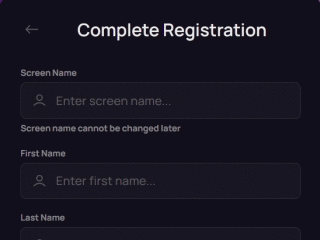Jaffe: So let’s set the stage. This is the double check-raise, eight off the money in the €200K Monte Carlo Invitational in 2024. You and Arthur tangled in a pretty wild one with sub-20 big blinds.
Haxton: I think even less than 20.
Jaffe: Arthur opens the hijack, you defend with . He c-bets on . Sub-20 bigs, ICM pressure, both of you short. How do you think about his c-bet range and your response?
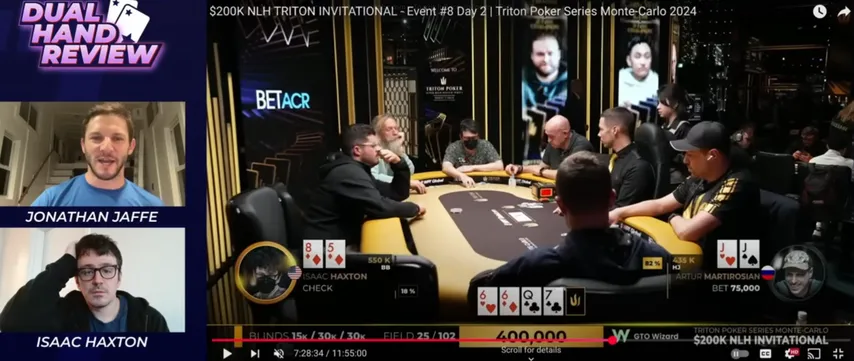
Haxton: Yeah, I'm treating this as playing pretty close to chip EV. We both have 20 big blinds. We both have around half average or a little less, even a third of the in-the-money average. It's not a spot where I'm thinking in terms of like waiting around and cashing soon. I'm thinking we play this basically like it's chip EV with maybe just a tiny amount of risk premium from both sides, where like we'd prefer not to play for stacks if absolutely not necessary. But yeah, we're playing for chips pretty much.
Dvoress: Alrighty. Hand breakdown versus Ike.
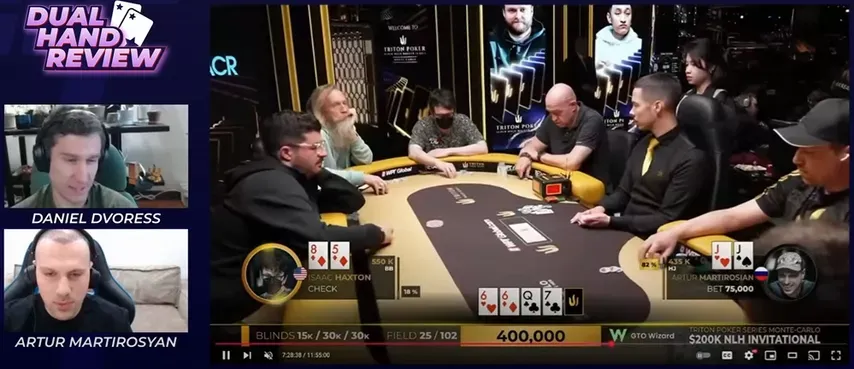
So, it picks up on the turn, but the flop action was: you c-bet for a small size and Ike check-raised. So talk to me about the flop strategy. Are you always c-betting, always calling the check-raise once you do c-bet, I'm assuming?
Martirosyan: So yes, if I remember right, it was like 20 in the money or 18. I don't really think that I have a wide c-bet range here. So I think my hand, if I play now, I would pure check. Okay. So yeah, I don't know. But to be honest, I was not in the best shape when I played this hand. But the tournament was very important. But yeah, so I'm talking the true fact.
Dvoress: But if I forced you to c-bet, you would call the check-raise on the flop obviously, right?
Martirosyan: Yeah, yeah.
Dvoress: So I think the turn decision is a lot more interesting than the flop. Before we get to your decision after check-raising the flop, are you surprised that Ike checked the turn to you instead of barreling when he picked up equity?
Martirosyan: Yeah, but at the moment, of course, I didn't know that he picked up the equity. But I just expected a lot of bets with all range from him. I didn't expect a lot of checks because in my opinion he wants to put pressure on me because I don't have a lot of sixes and he has a lot. He covered me before the hand, so he will defend big blind more wide.
So yeah, I expected a lot of bets on the turn, but maybe it was some exploit thing versus me. Maybe he expected that I will small bet turn often and he decided to check-raise more. I don't know.
— Back to Ike Haxton's perspective!
Jaffe: And you go for check-raise with the . Yeah, looks like Arthur bet somewhere between one and one and a half bigs and you ratchet up to four to four and a half bigs. Something like that?
Haxton: Yeah, there's almost 11 bigs in the pot on the turn and five and a half in pre. So I think maybe even a little less than that. I think maybe I made it like three big blinds on the flop.
Jaffe: And how do you arrive at check-raise with this eight-high backdoor hand?
Haxton: I mean, backdoor straight draw, backdoor flush draw on a board like this is very clearly in the region of hands good enough that you have to continue. It's a board where your player continues as raises rather than calls the overwhelming majority of the time. You can play some calls here. You could probably get away with a strategy that never calls and not really lose anything.
My hand feels like a natural one to play aggressively because most of the value is in making runner-runner straight or better or winning the hand without showdown. So relative to a bad top pair or an ace- or king-high hand, this is one of the ones that much more clearly feels natural as a raise. Although it would be fine to check-call it.
I think you do need things to bluff with after check-check-check turn, things to check-raise the turn with if you pick up outs. So you can do either one, but this feels much more natural as a raise. And your range is raising much more than it's calling. So I can't recall if I played it as a pure raising game or if I rolled for like mostly raises, but it would have been like 80% plus regardless. Just normal poker so far. Mostly you check-raise this hand when you get to this spot.
Jaffe: So, you mentioned something that sounded pretty common sense to you and maybe in theory does to those that study poker as well, but in practice, the concept that we're going to need something to check-raise bluff the turn is not the first thought I think on a lot of people's minds in terms of looking for their check-raises on the flop when they are sub-20 big blinds with two-thirds of the field cashing. So I do think that's, you know, something that kind of separates you here as this is not a hand even in Triton that we see every day.
Can you tell me first, Arthur has a pretty easy continue. Can he ever ditch the jacks on the flop? What's going on there?
Haxton: Oh, absolutely not. I think even something like threes or fours that's an underpair to the sixes and can get counterfeited is probably still a very clear continue. Although maybe the small pairs can fold, but certainly not sevens or better. You're continuing unpaired here a lot, like virtually any backdoor flush draw.
My raise is really small, too. The sizes were he bet a little more than one big blind, I made it three big blinds. He's getting like five to one or something. Yeah, I think it would be a huge mistake to fold the flop with jacks.
— Back to Artur Martirosyan's perspective!
Dvoress: Did you think that like once he checks he's more likely to just have turned a seven, something like that? Or were you kind of just thinking, well, if I bet here the hand becomes probably easier to play against people, it's always easier to play like this.
Martirosyan: Uh like Ike did in this hand, at that moment I wanted to play this hand easier. Yeah. And I expected a lot of just check-folds because he has a lot of hands that don’t pick up additional equity and so they just have nothing and he should check-fold these hands. Like if he just has ace-five of hearts or king-jack of diamonds or whatever. And if he catches 7x, so 7x probably will check-call small and check-check river.
Dvoress: But of course Ike is Ike. So he finds the check-raise.
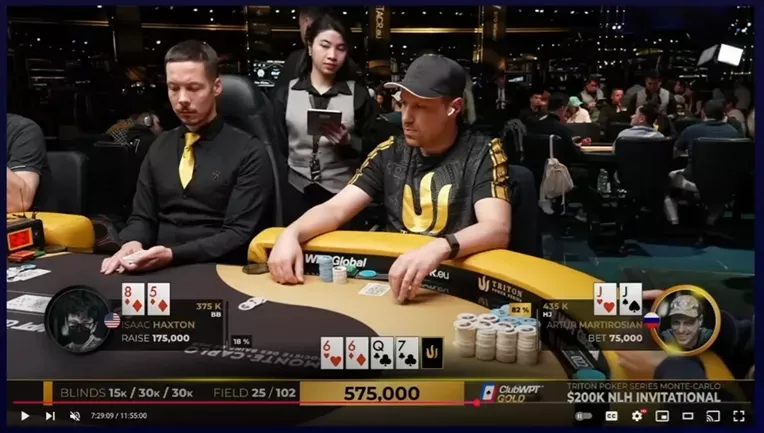
Martirosyan: Yeah. Ike is a very, very creative player. So he always finds like everything special.
— Back to Ike Haxton's perspective!
Jaffe: And you do opt for the check-raise.
Haxton: Very small. I go 175. So yeah, I choose about just over 20% pot check-raise here. And if he calls, that’s going to leave 335 behind into 675 on the river. So it’ll be a little less than half pot on the river. That feels about right. You know, I am facing his bet, there’s 400 in the middle, I’m risking 175, and then there will be a little less than half pot again on the river.
It’s from a certain perspective sort of geometric in the amount I’m risking relative to the pot. And it’s not actually geometric the way that’s usually calculated with like R20 and then B50. But, you know, I don’t think the size is hugely important. I think making it more than 250 here would seem weird. Min-raise would seem a little small, but I mean I just over min-raise. I think anywhere in the like 150 to 250 range here is probably just fine.
Jaffe: So you’ve explained this hand from a very theory point of view, but even if you’re following theory and to the best of your knowledge, it’s always possible, sometimes even likely, that your opponent is seeing this through an entirely metagame lens. Being like, “Ike just double check-raised me, kind of coming up on the money, thinks I’m overfolding or thinks I’m overcalling, whatever it is.”
Do you ever find yourself in these spots where you’re just kind of approaching it best you can theoretically, but you also suspect there’s a good chance my opponent might view this as a full, you know, metagame rock-paper-scissors moment?
Haxton: Sure. And you know, if I think that and I also think that I can get one step ahead of them and I know what they’re doing and I know what they think I’m doing, I’m going to try and do the opposite and trick them. I’m not categorically opposed to trying to do that.
But you know, the nice thing about approaching it from a more theoretical perspective is you don’t have to outguess them. I mean, occasionally you slam your bluff into somebody who’s never folding to you and you feel a little silly, but for every time that happens, you run into the opposite where they are certain you’d never bluff here, or you happen to have it this time and you slam your value hand into somebody who’s never folding.
And when you’re just playing in a theoretically sound, optimal or near-optimal, approximately optimal sort of way, you don’t have to guess right. So that tends to be the safer thing to do. The people I’m playing against in these high buy-in tournaments in general, and Artur in particular, are good at that kind of exploit/counter-exploit type of thing. And I’m not often way out on a limb trying to be one step ahead and outguess them.
Jaffe: Do you ever find yourself playing the flop with no intention of an exploit and then you get to a turn and you say, “Oh, wow. This is underdone.” Maybe, you know, maybe you check-raise twos here and the turn—well, I don’t know if you defend twos, but if you did—the turn comes a deuce and you say, “Theory be damned. I’m going to pure check-raise this for X, Y, or Z reason.”
Haxton: Oh, yeah. Of course.

Oh, yeah. Of course. I mean, you know, you’re playing the flop and there’s 40-some possible turns that can come out. I have not put together a plan for exactly what I’m going to do on every single turn card when I’m making the flop decision. So yeah, I could play the first one, two, three just according to theory, and then we get to a spot where suddenly I do have an exploit idea. That happens all the time.
I mean, very rarely—or I mean sometimes—I’m making an exploit decision from the first note of the hand. But much more often I’m playing normal theoretical poker through most of my decisions and then only when a certain thing happens do I come up with some kind of idea for an exploit thing I might try to do.
— Back to Artur Martirosyan's perspective!
Dvoress: So now that you are in this special line and facing this double check-raise, what are your thoughts now with ? Like are you approaching this from an exploit perspective now, or how are you even thinking about this spot that probably happens like once a year?
Martirosyan: Hahaha! My thoughts was that maybe he thinks I’m over-c-betting flop and he will check-raise wide. Then he thinks I will over-c-bet turn in this way. So he double check-raise me. Very unique spot, and this kind of spot you should overthink your opponent. So it’s not pretty much about theory when it goes into this line.
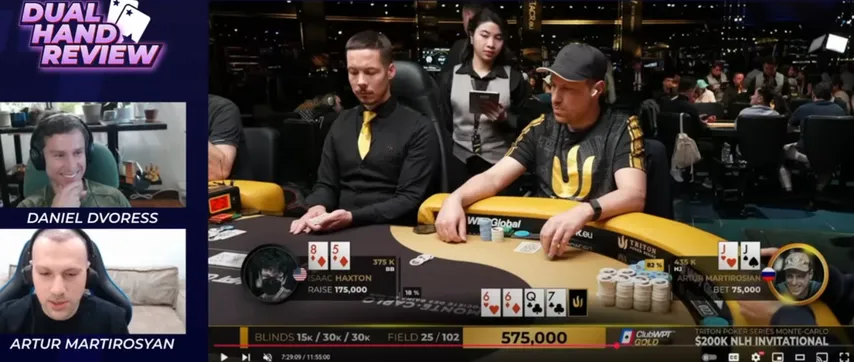
Dvoress: Yeah. I mean it seems like you’re actually right in what he thinks you might be doing and how he’s adjusting. I mean, it’s hard to know his frequencies, but he did check-raise kind of wide on the flop and then he did check-raise again on the turn. So now on the turn, like you just—you think you can’t fold jacks in theory, or you’re just not even thinking theory, you’re just like exploitatively, Ike is probably doing this too often, I can’t fold.
Which direction are you leaning in?
Martirosyan: I didn’t review this hand to be honest, so maybe I should. But yeah, I think it’s a low-frequency line and maybe we will not find it in theory, but if we find with some very low frequency, I think I should call turn and then I should decide river. It was unexpected for me because I expected a lot of bets with value and with bluffs as well.
Dvoress: One last question on the turn. Do you think your hand is better than ?
Martirosyan: So I prefer to have queen-jack in that spot, but I don’t really need in such ICM to have a big pot. So yeah, I think I probably did mistake on the flop and so I should check on the flop. Or if I go to the turn in this line with bet and call raise, so I need to check turn as well. But maybe I’m trying to understand now why I bet in the game. But yeah, I think the reason is simple. I wanted to play an easier line.
I didn’t want to have a decision on the river because I know Ike and I know that he can check-raise, check-check, and shove river with—also very possible line.
— Back to Ike Haxton's perspective!
Jaffe: Arthur’s decision here. This is tough. What do you think?
Haxton: I think his hand is too good to fold the turn. I would guess it’s not all that close. You know, he’s getting a very good price here. Not that much money has gone in. Like, sure, it’s a double check-raise, but we went to the flop with five and a half big blinds in the pot, 165k, and then another 75k each went in on the flop. And now it’s another 175k on the turn.
Like, he’s still unpaired a lot here. He’s high up in his range. His hand has good equity against my semi-bluffs relative to a lot of things he could have. Even like eights—you know, I’m more likely to have an overcard that’s live or whatever. I don’t think he can really be thinking about folding a hand as strong as jacks right away on the turn. The river will be a different matter where like that raw equity stuff no longer matters. He’s facing a shove and he either beats a bluff or loses to a value bet. But on the turn, I think it’s just too good a hand to consider folding. Although it’s beginning to get close, I don’t think it’s worth a lot.
Jaffe: We’re 16 months removed from this hand. So, I want to ask you—at that point in time, if you were to take all the regs on average, do you think a player in Arthur’s shoes should be overfolding overall at that point in time versus this line?
Haxton: If I had to go one way, I guess I’d say fold the close ones. I think this line is not that frequent. People don’t find the double check-raise super often, but given that they have, I mostly expect them to have a pretty reasonable range to do it.
Jaffe: So, you mentioned a population level, talking about the Triton regs. But moving off the Triton regs for a second—I’ve always had this theory of poker: essentially, when a kind of new play comes around, let’s say back in the 2008–2012 era, if somebody was opening off eight big blinds with any bluffs at all, my understanding was they were way overdoing the bluffs. Most, say 90% of people weren’t, but the small percentage that were, were disproportionately bluffing.
Then whenever 4-bet bluffing just started to popularize, there was still a large contingent of people who never 4-bet bluffed preflop. And the flip side was, if you 4-bet bluffed, you almost always were someone who over-4-bet bluffed. Sure, I don’t subscribe to this theory nearly as much anymore in the age of solvers being so ubiquitous, but there still are trickier plays to find. Do you think there’s anything to be said for mid-stakes players who, if they double check-raise bluff with any kind of frequency, they might be overdoing it? Or is that kind of thing dead these days?
Haxton: I don’t think that kind of thing is totally dead. I do think that, yeah, there can be a tendency for specific people or the metagame at large to get attached to pet plays that seem fun right now for some reason, and they are seeking them out more than is justified. And some things can be out of balance.
But I mean, this is in some senses still on a pretty normal line. Like obviously the flop is entirely normal. You get to the turn and at the first node of the turn, I think most pretty good players understand that you’re not betting 100% of the time after you check-raise the flop. They try to construct a range to check that makes sense, that has some of every different kind of hand.
Jaffe: And then you face the people with shove though. That’s what makes me wonder. Were pots getting just small enough where I’m not sure how many people have reached this SPR off a double check-raise that we’re going to get to?
Haxton: Maybe. I tend to not be exceptional at understanding how kind of intermediate-level pros who are less familiar with solver outputs but kind of trying to imitate them are thinking.
Jaffe: Another question: what would you do with ?
Haxton: I mean, bet it the first time a lot of the time. Raise small and call off if you get shoved on, or play it as a check-call. I think actually even my hand arguably plays better as a check-call, and I should be pulling the raises more from and rather than an open-ender, and check-calling the draws that are strong enough to check-call.
Jaffe: Arthur is feeling sick about betting the turn. He’s saying, “Why did I think this was going to simplify it? I’ve got Isaac Haxton over there.” So, Arthur’s time bank might go in here. I’ll fast-forward a little bit.
— Back to Artur Martirosyan's perspective!
Dvoress: Beautiful river. Just what you were hoping for—a !
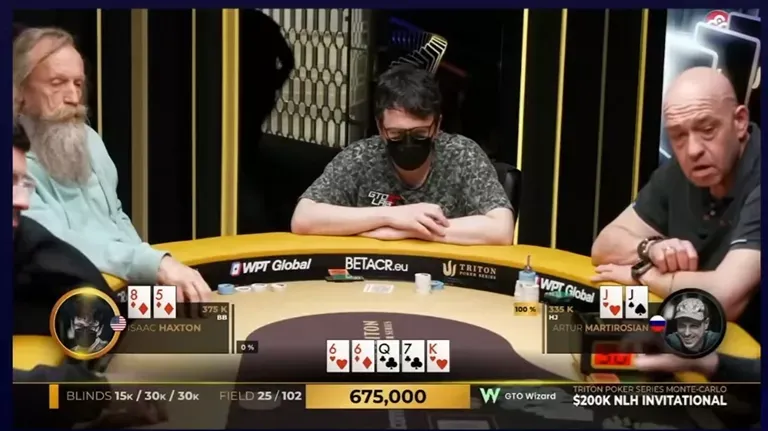
When he goes all-in, can you consider calling, or is the king too bad a card?
Martirosyan: Because my king-queen improved. So I probably will not fold like a queen and kings. So I get with kings, maybe some ace-king of clubs possible. So, and I have like absolute bottom. And maybe, maybe he will stop sometimes, maybe not. I don’t know. But he has like good, good hand to shove if he goes to the river in this line.
So, I think his hand he should shove like pure.
— Back to Ike Haxton's perspective!
Jaffe: River is king. You do have eight high, but want to know how many chips Arthur has.
Haxton: Yeah, absolutely sure that I did cover before I went all in here rather than like leave something behind.
I’m pretty certain I’m shoving, yeah. I think one thing I did think about in game is if I get to this point with queen no kicker, do I maybe want to try to bet like quarter pot or something like that rather than all-in? I can’t recall if in game I decided that I might try to do some of that. I think I have a hand that is a mandatory bet with no clubs, no card higher than eight. I think missed flush draws probably give up sometimes. Maybe even like , type of stuff—if I play it this way—can consider giving up on the river. But this hand, definitely not. Always going to follow through.
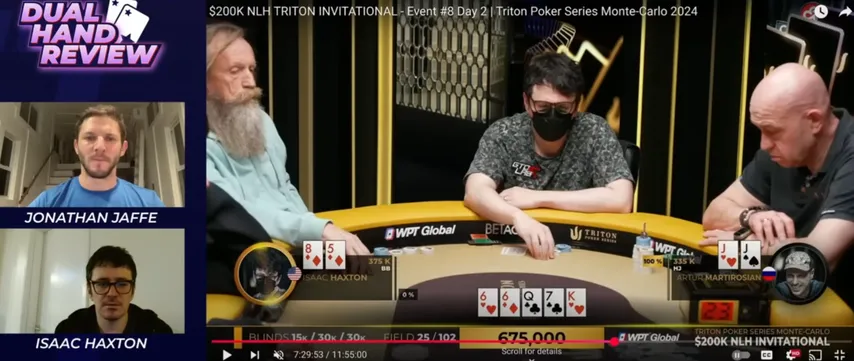
Jaffe: And how about Arthur? Does he have a decision here with the jacks?
Haxton: He certainly has a decision. Like, calling can’t be too bad. And he’d rather have this than 8x. I think he’d rather have this than most unpaired hands. You know, something like maybe is actually a better call than this hand. Like, I’m never bluffing with a pair. Probably never bluffing with ace-high. So once you get down into the region of hands that never beat value, don’t significantly block value, it gets tricky.
You have to try to work out if you have good, bad, or neutral card removal here. And you know everything has missed, so I’m going to have more than enough bluffs here. I’m going to be giving up with some bluffs, and you should be making me indifferent to following through with mediocre bluffs. So you have to hit a certain defend frequency, and you have to figure out which of your hands interact better or worse with your opponent’s range.
My instinct is that, you know, any pair matching the board—I think maybe not some stuff—is going to be a better call than this. Like any queen, any king for sure. And then, yeah, I’m just not sure about his exact hand. It does feel better than the lower pairs, and it does feel like you get to the river with a bunch of unpaired stuff that this is probably mostly better than. And I don’t know, maybe it’s a mix.
In game, I think I’d be reasonably likely to call his hand, but I don’t think it’s worth anything. If you have any hunch one direction or the other, I think you can probably deviate. Yeah. No super strong feelings about his spot on the river.
— Back to Artur Martirosyan's perspective!
Dvoress: Yeah, river is the easiest street. Yeah, for both of you in a way, right? Flop is annoying, turn is extra annoying, and then river you can just wait for something better maybe.
Kind of a tangent of a question, but I’m curious—if he checked, would you consider bluffing your hand?
Martirosyan: No. No. I think I snap check.
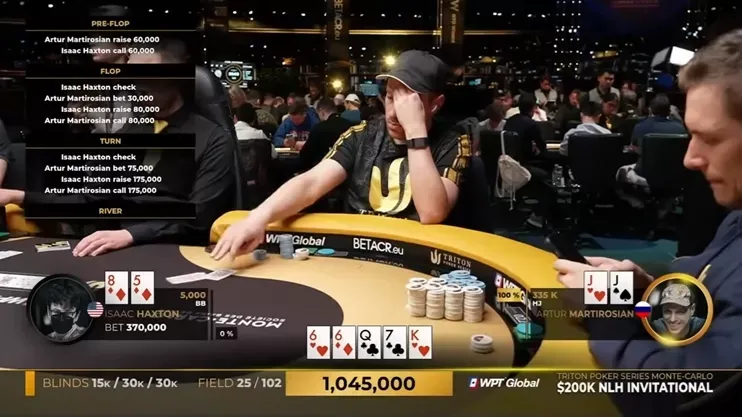
— Back to Ike Haxton's perspective!
Jaffe: Are you thrilled about this one or like, that was cool?
Haxton: This is an above average satisfying hand to win for sure.
It did feel good to get that outcome. I mean, it’s not often that you get half of the effective stack in with eight high and then get to bluff it on the river and get it through. And yeah, it was in a consequential spot. We’re close to the money in a really high buy-in tournament. A bit of an exotic line.
Yeah, it felt really good to win that one for sure.





















